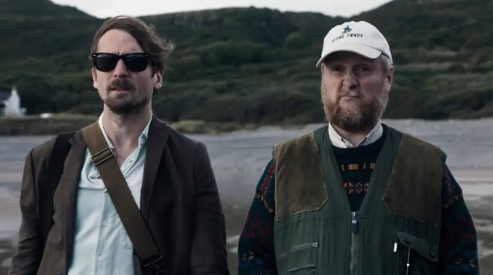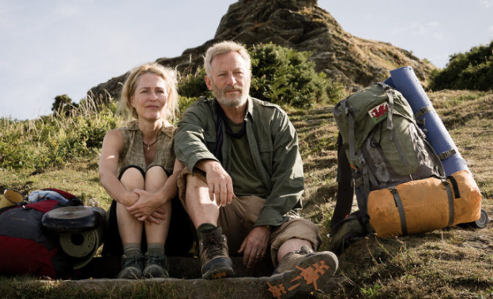THE BALLAD OF WALLIS ISLAND

Cast: Tom Basden, Tim Key, Carey Mulligan, Akemnji Mdifornyen, Sian Clifford
Director: James Griffiths
99 mins.
What if you could get your old favourite band back together, only to realise they are no longer compatible? They are no longer compatible, not just as musicians but also as people who can’t stand near each other without eventually self-destructing. The nostalgic dangers of wanting to revive the heyday of their earlier time, if only for a short while, are at the core of The Ballad of Wallis Island, an effortlessly charming British comedy, based on the BAFTA-nominated 2007 short film The One and Only Herb McGwyer Plays Wallis Island. Director James Griffiths, best known for his work on television with shows like A Million Little Things under his belt, and writer-stars Tom Basden and Tim Key, who make up half of the beloved Cowards British comedy sketch group, reunite to adapt their original short into a feature film. While the premise essentially stays the same, this feature-length adaptation adds Oscar-nominated actress Carey Mulligan as Nell Mortimer, the other half of the long-retired folk-rock duo at the centre of the story. The addition of Nell further builds upon the narrative’s themes of clinging too tight to nostalgia, providing a different perspective to balance the hilarious back-and-forth between Basden and Key. When international music superstar Herb McGwyer (Basden) is contacted to play a private gig for an eccentric millionaire on a remote island, he’s shocked to find almost no one upon arrival, let alone a pier for him to safely get off a small fishing boat. He’s greeted by Charles (Key), a loving goofball armed with an endless artillery of awkward puns and one-liners. With nothing but a few buildings, fishermen, and a single payphone on Wallis Island, it doesn’t take long for Herb to realise that he’s been contracted to perform for an audience of one. However, he’s not playing for just anyone, as Charles quickly reveals himself to be a diehard fan. Charles has used his incredible luck from winning the lottery – twice - to fund a private collection of Herb McGwyer music memorabilia in his large, Tudor-style mansion. Disgruntled, Herb decides to stay as Charles is offering him a vast sum of money for this single performance, which would be enough to fund his next commercialised solo record. But there’s another catch that Charles didn’t mention. Herb’s former music partner, who he hasn’t spoken to in nine years, Nell (Mulligan), is also coming to Wallis Island for what actually turns out to be a secretly orchestrated yet long-overdue reunion for their famous indie folk-rock duo act “McGwyer Mortimer.” Oh, and she’s brought her new husband, Michael (Akemnji Ndifornyen), along for the ride, too. Charles is paying a hefty fee and expects to hear Herb and Nell play all of their classic hits once more together, as McGwyer Mortimer, but not for reasons that are immediately obvious. Yes, he’s a mega, if not a bit overwhelming, fan with a private collection of Herb’s vintage guitars and maybe even a supposed lock of Nell’s hair bought on eBay to back it up. However, against everyone’s better judgement, his heart is in the right place. Charles isn’t crazy, he just genuinely wants to see these songs performed live one last time to take him back to better years in his life.
For Herb and Nell, though, singing these precious songs together again re-opens old wounds, re-contextualising whether they called it quits back in the day because of their failed romance or because he chose to pursue a solo career and go commercial with pop-rock music behind her back. It’s in the film’s main trio that the various effects of nostalgia are explored with nuance, with much of this credit going to Tom Basden and Tim Key’s hugely endearing script. Key is the glue that holds the trio together with almost non-stop hilarity, not because he’s constantly spewing out jokes but because he’s just so awkwardly wholesome. When paired with Basden’s dry wit, The Ballad of Wallis Island is at its best. Even though Carey Mulligan gets the short end of the stick from the small cast in terms of screen time, her added role, as previously mentioned, gives The Ballad of Wallis Island a more compelling reason to be adapted from a short flick to a feature. Mining nostalgia can both heal and inadvertently damage the soul, depending on how much one relies on it. While a concept like “getting the band back together” or embarking on a greatest hits tour, like McGwyer Mortimer briefly contemplate in the film, may seem fun and exciting, some things are admittedly better left in the past. Returning to relying on nostalgia for self-gratification or inflating the ego, almost like an addiction, as seen with Herb’s character arc, is often the easier option than simply letting go. Tom Basden and Carey Mulligan translate this theme graciously; the duo radiates a warm chemistry that makes their dynamic as ex-lovers all the more believeable. That genuine sincerity is then taken to the next level with the musical element of the film. Tom Basden wrote a slew of wonderful new original folk-rock songs to be performed by McGwyer Mortimer. He and Mulligan sing these soft tunes live together in a few intimate scenes, further adding to not only the authenticity of The Ballad of Wallis Island but also its endless charm. The Ballad of Wallis Island is a sweet and tender film about the painful act of letting go. Director James Griffiths frames the beautiful Welsh coastline with an emphasis on isolation, making the movie’s quirky antics feel like a type of comedic rehab for its characters. Laughter always proves to be the best medicine, and there should always be space for uplifting studio comedies like The Ballad of Wallis Island in the theatrical landscape, especially when they are as funny as this. The pleasant folk tunes elegantly brought to life by Tom Basden and Carey Mulligan are just the juicy cherry on top of a quite marvellous experience.

Cast: Gillian Anderson, Jason Isaacs, James Lance, Hermione Norris, Rebecca Ineson, Marianne Elliot
Director: Marianne Elliott
115 min.
At first, the difficult journey of the couple at the centre of “The Salt Path” doesn’t seem like a true story. There’s a lyrical flow to their revelations, so much so that each stop on their 630-mile hike seems crafted as an allegory to how perilous life can be. Assuming you were unaware of Raynor Winn's best-selling autobiographical novel of the same name, the ending may be something of a surprise - but that’s a compliment to the film that successful stage director Marianne Elliott has fashioned together for her feature film debut. The plot is quite straightforward as Raynor Winn (Gillian Anderson) and Moth Winn (Jason Isaacs) are embarking on the South West Coastal Path, the longest national trail in the United Kingdom that hugs the coastline from Minehead to Poole Harbour in Dorset. Over various flashbacks, we discover this isn’t meant as a relaxing holiday for the pair, as due to a legal dispute, the Winns have lost their farmhouse and are now homeless. With their barely adult children seemingly sufficient on their own, the Winns grab their camping supplies and whatever little money they have left, to follow a path they had always wanted to try in happier times. Now, Raynor hopes to find a miracle of inspiration on how to move forward. Over the days and weeks that follow, the Winns’ trek is complicated by Moth’s deteriorating health, and weather conditions that are often more dangerous than they expected. There’s a moment of respite over the winter when an old friend, Polly (Hermione Norris), lets them stay in a shed on her property if Moth renovates it. The shed provides much-needed shelter, and Raynor makes some cash as a temporary sheep shearer - something Anderson takes on with gusto - but the arrangement only sheds light on how little they now have in common with their new landlord. With Moth’s future unclear, they’d decided to leave the safe confines of their new habitat and return to finish the hike.
Beautifully shot by noted cinematographer Hélène Louvart, this portion of England often acts like its own character in the story. Often it seems happy the Winns are there gifting them wonderous moments of beauty and, sometimes, it rages against them, attempting to force them back to civilisation. Then again, Britain’s national tourism agency certainly won’t be complaining about the stunning vistas and dramatic cliffs that surround them on their epic walk. As the Winns round the final corner of the path, Rebecca Lenkiewicz‘s screenplay is somewhat hindered by the difficulty of conveying this true story in a different medium. Lenkiewicz attempts a moment of self-realisation for Raynor, in particular as, in a moment of optimism, the couple recognise their unbreakable love for each other, but it’s almost too demure to pull at the heartstrings, athough there’s nothing wrong with that. Of course to make all this work, you need actors of the extraordinary grace and talent of Anderson and Isaacs who are entirely believable as this pair staring down nature as an antidote to the cards life has dealt them. Both are excellent in essentially a two-hander, although they get support along the way from various people they meet or stay with.